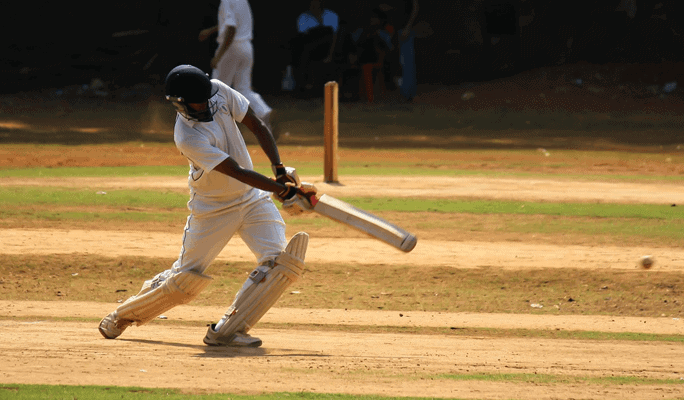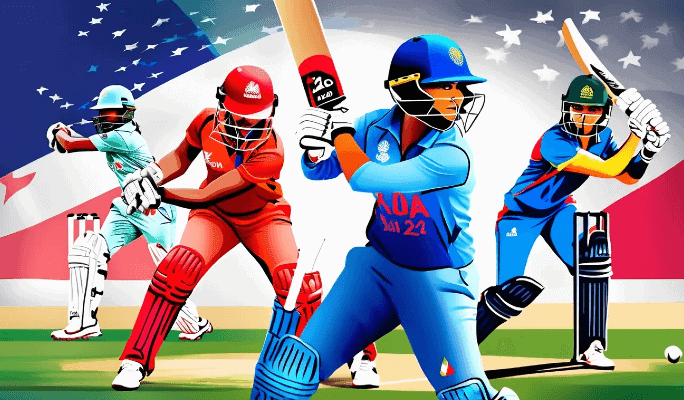
Cricket 101 – A Beginner’s Guide to Cricket
To a newbie, cricket may look like a confusing, complicated, and rather dull game. With so many players, fielding positions, and odd-sounding terms like “biffer”, “sticky wicket” and “Howzat!”, it’s no surprise that a novice watcher of cricket may feel stumped, so to speak. Our short beginner’s guide to cricket is here to help.
Let’s start with the above terms. Biffer is a slang term for an attacking batsman (who guns for lots of runs and plays ‘aggressively’); a sticky wicket is a wet pitch that makes play difficult; and “Howzat!” is something players shout as an appeal to the umpire to dismiss a batsman.
An entire glossary of cricket terms would certainly be overwhelming. And if we are honest, a cricket spectator only needs to know a few of them, plus some rules, to understand what’s going on. Next to that, the game itself is quite straightforward.
Therefore, we break cricket down into its simple basics.
The Game in a Nutshell
Two teams of 11 players compete with one another on a rectangular pitch in an oval field. A game involves a bat and ball and the aim is to score more runs than the other team. The team that scores the most runs wins.
Both teams take turns batting and fielding, swapping at the end of each innings. The batsmen try and get as many runs as possible before getting out.
There is a set of three stumps called a wicket on each side of the pitch. The batting team will always have two batsmen on the field who stand opposite each other, one in front of each wicket. One batsman is the hitter.
A player from the opposing team will bow to the batter in an attempt to dislodge his wickets while the player tries to hit the ball with a bat. If the batsman hits the ball, the batter guns it to their teammate’s wicket to tag it, swapping places with their partner who races to their wicket to tag it. This is a single run. The two players run back and forth tagging the wickets as many times as possible before the fielders get the ball or attempt to run them out.
If a batter misses a ball and it hits the wicket behind them, they are out.
Two umpires stand on the oval and officiate the match, and they make the decisions when it comes to dismissals, how fair a ball was, and other important aspects of the game.
Three formats of international cricket games
Below are the main things you need to know about the three formats and the differences between them:
| Test Match | Twenty20 Match | One Day Match |
|---|---|---|
| Red ball | White ball | White ball |
| At least seven hours per day of play | Three hours per day of play | About eight hours per day of play |
| Teams wear whites | Coloured uniforms are worn | Teams wear coloured uniforms |
| One match lasts up to five days (in the past many lasted longer) | Typically in the evenings | Usually starts in the early afternoon |
| Played in daylight | Played partially under floodlights | Partly played under floodlights |
| 90 overs a side each day | 20 overs a side | 50 overs a side |
Some Basic Cricket Terms
No beginner’s guide to cricket would be complete without an overview about the basic cricket terms:
Run: The name for points in cricket. Players score runs by hitting the ball bowled at them away from the wicket and running between the two wickets on each end of the pitch. They also automatically score four to six runs when they hit the boundaries (the ball goes beyond the edge of the playing field) with the ball. In this instance, they get four runs if the ball bounces before it crosses the boundaries, and six if it doesn’t bounce.
Over: This is a set of six consecutive fair ball deliveries bowled towards a player at one wicket. At the end of the over, the fielding team switches to the opposite direction, bowling towards the other wicket for another over. Closing the latter, the teams change bowling direction again.
The number of overs a team gets changes depending on the game format. In One-Day Internationals, each team bowls a maximum of 50 overs. During test matches each team gets no more than 90 overs on each day. In short and speedy Twenty20 cricket, there are 20 overs a side in a game.
Dismissal: This is when the fielding team ends a batsman’s turn at batting by getting them out. Umpires can dismiss batsmen for various reasons, including when they are bowled out or caught out.
Innings: Matches are divided into innings, which are segments of time in which one team bats while the other bowls and fields. A match has two innings, except for test matches which have four innings. An innings ends when all batsmen on a team are out.
How Popular is Cricket on a Global Scale?
The answer is very. Cricket isn’t just beloved in South Africa, India, and the UK. The sport has a total 2.5 billion fans worldwide, making it the sport with the second-largest global fanbase (football has the largest with a whopping 3.5 billion fans).
On Sports Show’s 2020 list of the 10 most popular sports in the world, cricket placed number 2, again just below football. When Sports Show was curating the list, they measured the popularity of each sport according to several criteria, including global fanbase size, viewership, top athletes’ average salaries, number of pro leagues, social media presence, gender equality, and more.
It should be said that cricket is only super popular in around 15 to 20 countries, and these make up the larger part of the sport’s fanbase. Nevertheless, the cricket fever is slowly spreading across more and more nations. Therefore, we should see a more diverse and widespread fanbase of the sport soon enough.
We hope our beginner’s guide to cricket has been helpful for you. If you want to put your knowledge to the test have a look at our best betting sites for cricket betting online.



